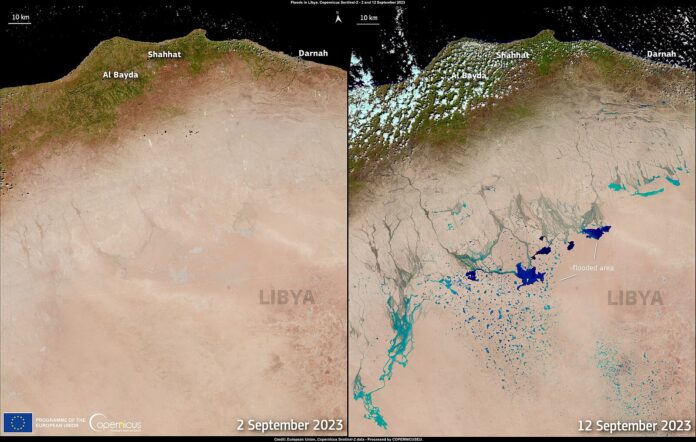Over 11,000 lives have been lost due to devastating flooding in Libya. Derna, a Mediterranean coastal city, has borne the brunt of this catastrophic event, with local authorities reporting at least 11,300 deaths. The storm and floods have left a quarter of Derna city in ruins, causing residents to grapple with the destruction of their homes and the search for the bodies of their loved ones.
Meteorologists also point to the storm’s intensity, consistent with the pattern of extreme weather events linked to human-induced climate change. Heavy rains overwhelmed the dams in Derna, sending torrents of water into areas already inundated by the floods.
The catastrophe unfolded when a dam failed, unleashing a torrent of water that submerged entire neighborhoods where the river meets the coast. Disturbing video footage from the region reveals the grim reality: dozens of corpses lined up in hospital yards and bodies buried in mass graves, with authorities bracing for the death toll to climb even higher.
This tragedy is compounded by the fact that Libya, a country already shattered by more than a decade of conflict and divided between rival governments, was ill-prepared to handle such a disaster. The infrastructure neglect due to factional fighting and widespread poverty have left the dams in disrepair for years.
Over 7,000 people are injured, and over 30,000 have been displaced. Hospitals in Derna cannot operate, and morgues are overflowing, exposing bodies on the sidewalks. The devastation is not limited to Derna alone, as other cities in eastern Libya, including Benghazi, were also hit by the storm.
Among the victims are at least 84 Egyptians, highlighting the international ramifications of this disaster. The rescue efforts are further complicated by Libya’s existing division and turmoil, stemming from more than a decade of conflict, which has left infrastructure neglected and the population in dire poverty.
International assistance is crucial in the face of this tragedy. The US is sending emergency support/funds to relief organizations and working closely with Libya and the UN to provide further support. Turkey and other countries have rushed aid to Libya, offering search and rescue vehicles, boats, generators, and food.
As the search for survivors continues and communities grapple with the scale of the disaster, it serves as a complete reminder of the arrangement needed for disaster preparedness, infrastructure maintenance, and climate resilience in vulnerable regions like Libya.
This image contains data from a satellite in the Copernicus Programme and contains modified Copernicus Sentinel data 2023.









